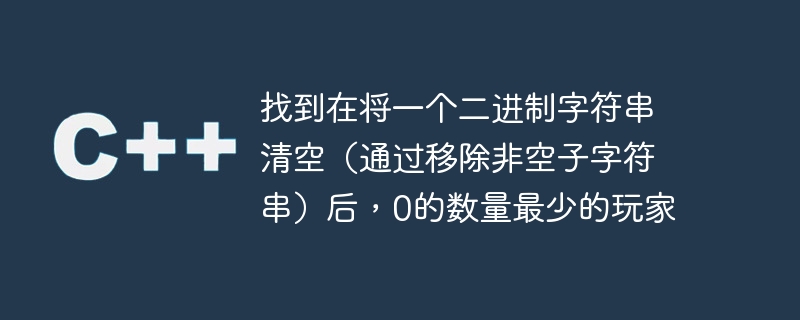

In this article, we will discuss an interesting problem related to the field of string manipulation and game theory: "Empty a binary string by removing non-empty substrings and find the remaining 0 Least Players”. This question explores the concept of using binary strings for competitive gaming. Our goal is to find the player with the fewest 0 remaining at the end of the game. We will discuss this issue, provide a C code implementation, and explain the concept through an example.
Two players are given a binary string and they take turns playing the game. On each turn, the player removes non-empty substrings that contain at least one "1". The game ends when the string becomes empty or there is no "1" in the string. Players unable to take action lose the game. The task is to find the player with the smallest number of final 0s.
To solve this problem, we need to count the number of segments separated by '0' that have at least one '1'. The player who starts the game always chooses the fragment with the most '1's. Therefore, unless the number of fragments is an even number, the first player can always ensure that they remove more '1's than the second player. In this case, both players can remove an equal number of '1's.
The following is the C code to implement the above strategy:
#include<bits/stdc++.h>
using namespace std;
int findWinner(string s) {
int segments = 0;
for (int i = 0; i < s.size();) {
if (s[i] == '1') {
segments++;
while (i < s.size() && s[i] == '1') {
i++;
}
}
i++;
}
return segments % 2 == 0 ? 2 : 1;
}
int main() {
string s = "100101";
int winner = findWinner(s);
cout << "Player " << winner << " wins";
return 0;
}
Player 1 wins
This code iterates over the string, counts the number of segments, and then checks whether the number of segments is even or odd to determine the winner.
Let us consider the binary string "100101". The fragments in this string are "1", "1" and "1". Since the number of pieces is an odd number, the first player will win the game since they are able to remove more '1's than the second player.
In this article, we study the problem of finding the player with the least 0s after emptying a binary string by removing non-empty substrings. This problem presents a fascinating intersection of string manipulation and game theory. We explore the problem, outline an approach to solving it, provide a C code implementation, and elaborate on the concept using examples.
The above is the detailed content of Find the player with the fewest number of zeros after emptying a binary string (by removing non-empty substrings). For more information, please follow other related articles on the PHP Chinese website!




